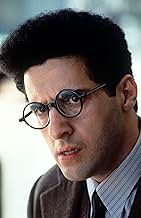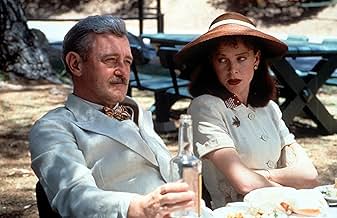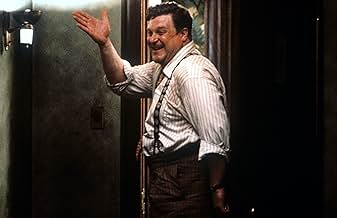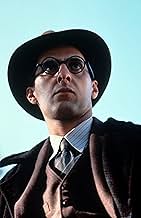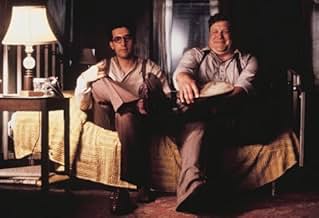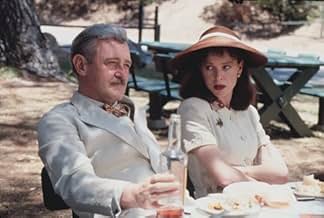Ein renommierter New Yorker Bühnenautor lässt sich von einem Angebot nach Kalifornien locken, um dort für den Film zu arbeiten, und lernt dabei die infernalischen Abgründe Hollywoods kennen.Ein renommierter New Yorker Bühnenautor lässt sich von einem Angebot nach Kalifornien locken, um dort für den Film zu arbeiten, und lernt dabei die infernalischen Abgründe Hollywoods kennen.Ein renommierter New Yorker Bühnenautor lässt sich von einem Angebot nach Kalifornien locken, um dort für den Film zu arbeiten, und lernt dabei die infernalischen Abgründe Hollywoods kennen.
- Regie
- Drehbuch
- Hauptbesetzung
- Für 3 Oscars nominiert
- 19 Gewinne & 29 Nominierungen insgesamt
Meagen Fay
- Poppy Carnahan
- (as Megan Faye)
Empfohlene Bewertungen
You are either going to love or hate this one, and I doubt you'll know which until it's over. Maybe you won't know even then.
In 1941, Barton Fink (John Turturro) is a successful Broadway playwright. Now that he's got some success under his belt, he says he wants to write plays for "the common man". But his agent has a tempting offer. A movie studio wants him to come to LA and write screenplays for 1000 dollars a week. The agent convinces him to go. Barton checks into the Hotel Earle, which has ornate decorations in the common areas, but is a dump from the standpoint of Barton's room. The heat has the wallpaper peeling off the walls. The sole decoration in Barton's room is the picture of a woman sitting on the beach, her arm raised to block the sun. Remember this picture - it's important.
Barton's first assignment is to write a "wrestling picture" starring Wally Beery. But Barton has writer's block for assorted reasons, one of them being that he knows nothing about this subject. So he stares at his typewriter with the dread an insomniac might stare at his bed. But then what seemed to start out being a film about how the studio system can beat the creativity and the confidence out of a successful writer changes course and becomes something that is completely surreal and even nightmarish by the end. I can really say nothing more specific than that without giving things away.
The Coens wrote Barton Fink when they were having writer's block trying to write Miller's Crossing because of the complexity of the plot. So did they manage to pack lots of symbolism into a tight, coherent package, or did they simply let their imagination run wild and undisciplined in an attempt to get back on track on the other film? I have no idea. I just know that I like it and - for me - it's great for repeat viewings.
One more thing - How can it be so hot in LA, and then suddenly WWII has started, which would make it December? Why is it Barton doesn't seem to notice WWII has started without being told and then really has no reaction. He really isn't plugged into "the common man" is he?
In 1941, Barton Fink (John Turturro) is a successful Broadway playwright. Now that he's got some success under his belt, he says he wants to write plays for "the common man". But his agent has a tempting offer. A movie studio wants him to come to LA and write screenplays for 1000 dollars a week. The agent convinces him to go. Barton checks into the Hotel Earle, which has ornate decorations in the common areas, but is a dump from the standpoint of Barton's room. The heat has the wallpaper peeling off the walls. The sole decoration in Barton's room is the picture of a woman sitting on the beach, her arm raised to block the sun. Remember this picture - it's important.
Barton's first assignment is to write a "wrestling picture" starring Wally Beery. But Barton has writer's block for assorted reasons, one of them being that he knows nothing about this subject. So he stares at his typewriter with the dread an insomniac might stare at his bed. But then what seemed to start out being a film about how the studio system can beat the creativity and the confidence out of a successful writer changes course and becomes something that is completely surreal and even nightmarish by the end. I can really say nothing more specific than that without giving things away.
The Coens wrote Barton Fink when they were having writer's block trying to write Miller's Crossing because of the complexity of the plot. So did they manage to pack lots of symbolism into a tight, coherent package, or did they simply let their imagination run wild and undisciplined in an attempt to get back on track on the other film? I have no idea. I just know that I like it and - for me - it's great for repeat viewings.
One more thing - How can it be so hot in LA, and then suddenly WWII has started, which would make it December? Why is it Barton doesn't seem to notice WWII has started without being told and then really has no reaction. He really isn't plugged into "the common man" is he?
I am absolutely amazed at the fantastic taste of the imdb readership, having loved this film for years and always been told by people I'd told about it and persuaded to watch that it was no good, I finally find some other people out there who love it as much as me, posting (mostly) extremely positive comments...This is a fabulous film, dripping with a brooding, sticky atmosphere that draws you in to the clammy world of Barton Fink, sat in his hotel room listening to the creaking of the wallpaper as it dribbles moistly from the walls, searching for inspiration in his tacky painting and dusty typewriter...Perhaps it is a little dark for some tastes, but as black comedy goes this is the blackest and the most biting there is, the Hollywood system and New York theatrical snobbery lampooned with equal viciousness. Deep insight into the nature of the creative spirit, a plethora of fine performances bringing at first stereotypical characters to full life (despite the unreal, fable-like atmosphere created by the slimy, glistening colours reminiscent of the films of Jeunet&Caro...), and many moments of hilarity make this a perfect movie, one I would not hesitate in recommending to anyone despite the fairly high probability they will hate it. A lack of any underlying morality, an absence of absolutes of right and wrong, good and bad, give this film a unique feeling that it could go anywhere. The last twenty minutes are about the most powerful I have ever seen in anything, at the end of almost every scene I thought it could end there and be an amazing film, yet each further scene only added further depth and poignancy. The first time I saw it, it left me drained, mind spinning, hands shaking, barely able to reach for the remote to rewind it to watch it again...
The Coen brothers have come a long way from their start with an 8mm camera. They have written and produced some great homages to the film noir era of Hollywood, and this film is no exception.
First, is the great dialog written by the brothers. Great dialog is a feature of their films, and this one has some of the most memorable I have heard. You can almost turn off the visual and just listen and be enchanted and know you are listening to a Coen brothers film.
But turning off the visual would deprive you of the great cinematography of Roger Deakins. His can frame a scene to the point that you could pause the film and just soak in the texture and color and realism. It is almost as if every frame is a painting.
The Coen brothers also seem to get the best performances out of an actor that I have seen. John Goodman is brilliant in this film and he seems to do his best work for the Coens. John Turturro is captivating as the hack writer who talks about his love for the common man, but just really doesn't know the common man and really doesn't care about them. Michael Lerner was brilliant as the requisite man behind the desk that is the feature of 40's noir.
One doesn't always know what is in the Coen brothers minds. Is this a foretelling of the rise of Nazism, of intellectuals who really didn't understand the appeal of fascism to the common man, or a surreal portrait of someone who sells out. No matter what their intention, they make you think and return to see their films again and again.
First, is the great dialog written by the brothers. Great dialog is a feature of their films, and this one has some of the most memorable I have heard. You can almost turn off the visual and just listen and be enchanted and know you are listening to a Coen brothers film.
But turning off the visual would deprive you of the great cinematography of Roger Deakins. His can frame a scene to the point that you could pause the film and just soak in the texture and color and realism. It is almost as if every frame is a painting.
The Coen brothers also seem to get the best performances out of an actor that I have seen. John Goodman is brilliant in this film and he seems to do his best work for the Coens. John Turturro is captivating as the hack writer who talks about his love for the common man, but just really doesn't know the common man and really doesn't care about them. Michael Lerner was brilliant as the requisite man behind the desk that is the feature of 40's noir.
One doesn't always know what is in the Coen brothers minds. Is this a foretelling of the rise of Nazism, of intellectuals who really didn't understand the appeal of fascism to the common man, or a surreal portrait of someone who sells out. No matter what their intention, they make you think and return to see their films again and again.
While many of us know "Fargo" and "Big Lebowski", many fans still haven't heard of "Barton Fink", which is too bad. This is probably John Turturro's best role (and his least weird). Tony Shalhoub also gives an outstanding performance (at least as good as he was in "The Siege").
John Goodman? Heck, even he is pretty good here and I'm not a big fan of his (though the Coen Brothers do him justice like no others can). His portrayal of the questionable neighbor just really suits him.
There is supposed to be deep symbolism in this film -- some say it's an allegory for the rise of Nazism (and I can see that), while others say it's just a critique of Hollywood. I don't know. But, you know what? No matter what it's about, it's beautiful in a nihilistic way... and you will want to know: what's in the box? And I'm not going to tell you.
John Goodman? Heck, even he is pretty good here and I'm not a big fan of his (though the Coen Brothers do him justice like no others can). His portrayal of the questionable neighbor just really suits him.
There is supposed to be deep symbolism in this film -- some say it's an allegory for the rise of Nazism (and I can see that), while others say it's just a critique of Hollywood. I don't know. But, you know what? No matter what it's about, it's beautiful in a nihilistic way... and you will want to know: what's in the box? And I'm not going to tell you.
I recently purchased "Barton Fink" along with "Miller's Crossinhg", another Coen Brothers gem.
Barton Fink quite simply is a writer who cannot see the forest for the trees. He is so taken with the fact that he is a writer that he can't write. He is so idealistic that he misses fantastic opportunities to become a writer for the ages because he wastes precious time proselytizing. John Goodman perfectly sums up everyone's frustration with Barton Fink when after a series of unfortunate occurrences, Barton asks him "Why me?" to which John's character answers "Because you don't LISTEN!" Set in 1930s Hollywood we follow the exploits of a one-hit wonder, Barton Fink, who has written a successful Broadway play and is summoned by the powers that be to Hollywood. After much cajoling to take the job from his agent, Barton arrives in Los Angeles determined to become the writer for the common man where he insists true stories live. The trouble with Barton, however, is he does not have time for the common man because he has so romanticized their lot as well as his particular quest in speaking for them.
Excellent performances from John Turturo, John Goodman, Judy Davis, John Polito (often overlooked, but his scenes ALWAYS become his!!) and the inimitable Tony Shaloub.
I have decided after a slew of Coen Brothers films I currently have in my collection, that any project these guys are involved with deserve more than passing scrutiny.
Barton Fink quite simply is a writer who cannot see the forest for the trees. He is so taken with the fact that he is a writer that he can't write. He is so idealistic that he misses fantastic opportunities to become a writer for the ages because he wastes precious time proselytizing. John Goodman perfectly sums up everyone's frustration with Barton Fink when after a series of unfortunate occurrences, Barton asks him "Why me?" to which John's character answers "Because you don't LISTEN!" Set in 1930s Hollywood we follow the exploits of a one-hit wonder, Barton Fink, who has written a successful Broadway play and is summoned by the powers that be to Hollywood. After much cajoling to take the job from his agent, Barton arrives in Los Angeles determined to become the writer for the common man where he insists true stories live. The trouble with Barton, however, is he does not have time for the common man because he has so romanticized their lot as well as his particular quest in speaking for them.
Excellent performances from John Turturo, John Goodman, Judy Davis, John Polito (often overlooked, but his scenes ALWAYS become his!!) and the inimitable Tony Shaloub.
I have decided after a slew of Coen Brothers films I currently have in my collection, that any project these guys are involved with deserve more than passing scrutiny.
Wusstest du schon
- WissenswertesThe first film to win all three major awards (Palme D'or, Best Director, and Best Actor) at the Cannes Film Festival. Also, it was unanimously chosen for the Palme D'or.
- PatzerBriefly visible at the top of the screen when Detective Mastrionotti introduces himself to Barton.
- Zitate
Charlie Meadows: Look upon me! I'll show you the life of the mind!
- Crazy CreditsThe 20th Century Fox logo appears over silence; the "fanfare" is not played.
- VerbindungenEdited into The Clock (2010)
- SoundtracksFor Sentimental Reasons
by Edward Heyman, Al Sherman and Abner Silver
Licenced with Permission the Successors of Marlo Music Corporation (ASCAP)
Top-Auswahl
Melde dich zum Bewerten an und greife auf die Watchlist für personalisierte Empfehlungen zu.
Details
- Erscheinungsdatum
- Herkunftsländer
- Sprache
- Auch bekannt als
- Бартон Фінк
- Drehorte
- Produktionsfirmen
- Weitere beteiligte Unternehmen bei IMDbPro anzeigen
Box Office
- Budget
- 9.000.000 $ (geschätzt)
- Bruttoertrag in den USA und Kanada
- 6.153.939 $
- Eröffnungswochenende in den USA und in Kanada
- 268.561 $
- 25. Aug. 1991
- Weltweiter Bruttoertrag
- 6.154.231 $
- Laufzeit
- 1 Std. 56 Min.(116 min)
- Farbe
- Sound-Mix
- Seitenverhältnis
- 1.85 : 1
Zu dieser Seite beitragen
Bearbeitung vorschlagen oder fehlenden Inhalt hinzufügen




